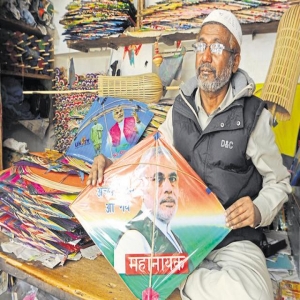
.png) Cedric Prakash
Cedric Prakash
.jpg)
It is late evening, the day after Uttarayan (15 January), traditionally called 'vasi uttarayan.' It has been a dull, cloudy day; the wind has been fairly good, though. Since yesterday, thousands have been on building tops, flying their kites, and many others have been running on the streets to catch the 'cut' kites. At this moment, the skies are pocked with thousands of kites, and music of every possible strand blares loud, from rap songs to the latest filmi Hindi ones - the yells and the screams continue to pierce the air. No match, however, for the loud crackers. It is a great day indeed – as people from across the board bond together to celebrate diversity!
'Makar Sankranti' (traditionally on 14 January) is one of the great Festivals of India. It essentially marks the transition of the sun from the zodiac of Sagittarius (dhanu) to Capricorn (makara). As this transition coincides with the sun's movement from south to north, the festival is dedicated to 'Surya,' the Sun God. It marks a new beginning as it is also observed as a 'harvest festival' in several places. Across the country, this festival is spread over a period of days – a true celebration of diversity.
The festival is known by different names across the country: Uttarayana in Gujarat and Uttar Pradesh, Sankranthi or Peddha Panduga in Andhra Pradesh and Telangana, Khichari in Bhojpuri region, Magh Bihu in Assam, Maghi Saaji in Himachal Pradesh, Makaravilakku in Kerala, Makara Sankranti in Karnataka, Maghi Sangrand in Punjab, Pongal in Tamil Nadu, Maghi Sangrand in Jammu, Sakrat in Haryana, Sakraat in Rajasthan, Sukarat in central India, Ghughuti in Uttarakhand, Dahi Chura in Bihar, Makar Sankranti in Odisha, Jharkhand, Maharashtra, Goa, West Bengal (also called Poush Sankranti or Mokor Sonkranti), Besides these, there are other variations and names given in other States to this great festival which highlight the celebration of diversity.
In Gujarat, particularly in the city of Ahmedabad, the high point is 'kite-flying'! There are thousands of kites that dot the skies, and there are all kinds of shapes, sizes, colours, and even textures. It is a belief that a kite is an offering to God to propitiate 'Surya' and thank him for the winter just gone by. The fact is that today 'kite-flying' is mainly a source of entertainment (sometimes an obsession), but also one of competition. It is common knowledge that most kites and even the manja (kite-string) are made by the Muslim community (they come to states like Gujarat as seasonal migrants from UP and Bihar).
In January 2003, the first Uttarayan after the Gujarat Carnage 2002, the Hindutva elements made an all-out campaign to prevent the people of Gujarat from buying kites made by Muslims. They did plenty of propaganda for 'kites made by Hindus!' Unfortunately, all their efforts went flat! The people still bought kites they desired too; the 'Hindutva' kites had practically no sale – even those sold were not flyable! A pathetic commentary on exclusiveness. The average Indian believes in and celebrates diversity.
What Gujaratis love to eat at this festival is a traditional dish called 'undhiyu'- a mixed vegetable dish. The name of this dish comes from the Gujarati word 'undhu,' which translates to upside down, since the dish is traditionally cooked upside down underground in earthen pots, termed 'matlu,' which are fired from above. There is a whole variety of vegetables which are needed to make undhiyu; some are a must, like baby potatoes, eggplant (brinjal), purple yam (ratalu), sweet potato, surti papdi, green bean, unripe banana and methi muthia. There cannot be undhiyu if some of these base vegetables are missing. The tasty dish is a veritable celebration of diversity.
The most popular sweet item (dessert) during this festival season is the jalebi! People simply love this deep-fried snack, which is dipped into sugar syrup before being walloped. Its roots are in Arabia, thanks to the Mughals, who gave us a variety of delicious 'mithai' (which we call 'Indian Sweets' today!). The all-time favourite snack (the ones fried in pure ghee cost a mind-boggling Rs. 700/- a kilo this year) not only tickles the taste buds of those celebrating the festival, but it has also been able to demonstrate the fact that we need each other: the best way we can do so is to celebrate diversity!
It is nearing the end of 'vasi uttarayan.' The dark skies have phantom kites flying high into them, but all along, there are lanterns all lit, deftly tied to the string, which makes one just say, "WOW!" Soon, the string will be cut, and the kite will fly into oblivion into the night skies! But the kite is free! One is reminded of the poem 'Untethered Kite' written by Squid the Russell; some verses go thus:
I wish I had arms
To reach down
With a pair
Of gleaming scissors
To cut my tether
I wish I had a voice
To tell them what I want
What I think
Because they won't listen
Won't pay attention
To my relentless fight
To my constant struggle
Against the confines of my rope
Won't someone set me free?
Can't somebody help me?
To become an untethered kite
The plain truth is that if we truly want to celebrate diversity, embrace differences, and enhance pluralism, we will all have to become untethered kites—free to go where the wind blows and ensure change! Above all, we must have the courage not to allow anyone else to enslave us or to attempt to chain us down! Let us celebrate diversity—it is our right to do so!